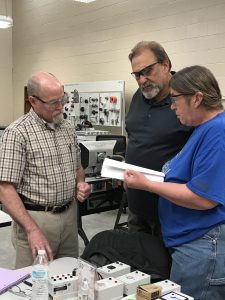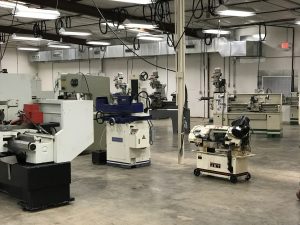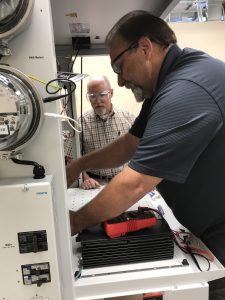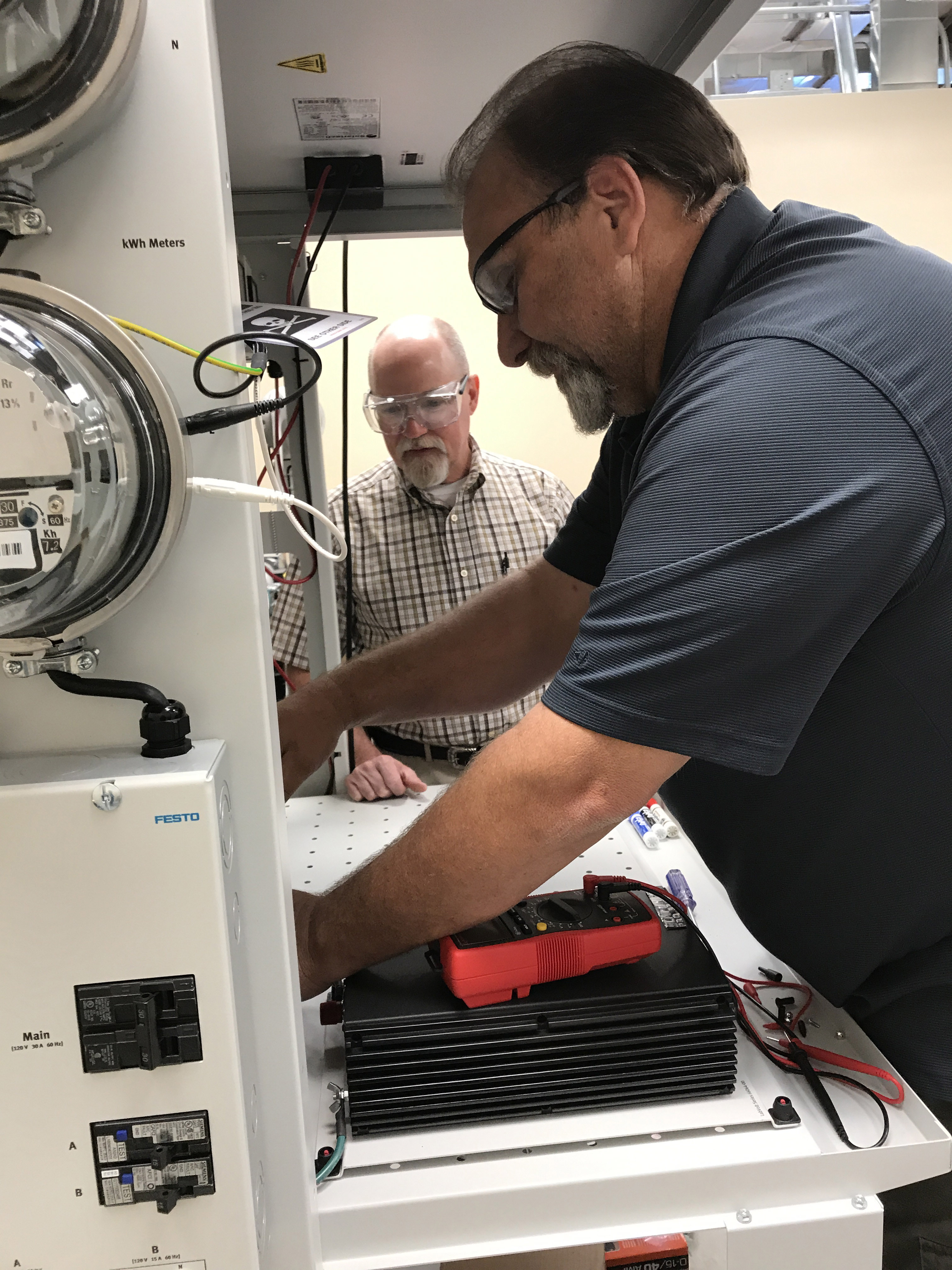Technology has advanced at an exponential rate over the past few years, and as such students seeking a career in that field must be well prepared to deal with those changes. To that end, Missouri State University-West Plains offers the Associate of Applied Science (AAS) in Technology, to prepare students for an ever-changing field that fosters the advancement of an ever-changing world.

“If a student has a love of lifelong learning, this is the degree to pursue,” said Assistant Professor of Computer Information Systems and Computer Graphics and Programming Jim Hart. “To keep up with advances in technology, the technician must continually study and learn in order to solve current problems, as well as the problems of the future.”
There are four focus options for the AAS in Technology: Advanced Manufacturing, Alternative Energy, General Technology and Technology Management. There are 17 credit hours of general education requirements and nine technology core requirements; the remaining 36 credit hours will vary based on the chosen option, Hart said.
- Advanced Manufacturing consists of the interdisciplinary fields used in the latest manufacturing industries: Industrial Electricity and Electronics, Mechanical Systems and Fluid Power, Manufacturing Materials and Processes, and the Manufacturing Technology in use for Automated Manufacturing. Additionally, Employee Management and Supervision, Supply Chain Management and Technology Management are a part of the learning process to develop technologists into leaders.
- Alternative Energy consists of the interdisciplinary fields used in the latest energy conversion industries: Industrial Electricity and Electronics, Biofuels, Solar and Wind. Additionally, a good foundation of the sources of energy and resources on the planet is explored through Agriculture, Chemistry and Forestry, as well as Sustainable Agriculture and the Environment.
- General Technology consists of a broad range of interdisciplinary fields which allow a student to discover and explore the various uses of technology in the world, including agriculture, business, computers, engineering, fire science, law enforcement, mathematics, science, technology, enology and viticulture. This option also enables a student to transfer block classes from South Central Career Center in West Plains and the Ozark Mountain Technical Center in Mountain Grove.
- Technology Management prepares a student for the supervisory element required in the use of technology in a broad scope of industries by providing elements of accounting, macroeconomics, employee management and supervision, communications and supply chain management, as well as the need for quality, safety and project management.
Hart said students can fill a variety of jobs with the AAS-Technology degree, including alternative energy entrepreneur, automated manufacturing technician, biofuels technician, electrician’s apprentice, field service technician, hydraulics and pneumatics technician, manufacturing technician, robotics technician, solar energy technician and wind energy technician. And the employment outlook is good.
“Employment in the South Central area of the state totaled more than 64,500 in 2012 and is projected to grow by 8.5 percent by 2022,” Hart said. “Total job openings between 2012 and 2022 are expected to grow by 28.5 percent coming from new growth. Occupations are divided into ‘Now, Next and Later’ categories based on the typical training and education required. ‘Now’ occupations usually require one to 12 months of on-the-job training. ‘Next’ occupations usually require more than one year of on-the-job training and can additionally need specific work experience. These occupations often require an associate’s degree or vocational certificate. ‘Later’ occupations usually require a bachelor’s degree or higher and may need specific work experience. Providing our students with a pathway to the anticipated growth in businesses and industry will not only meet the current needs, but the ‘Next’ and ‘Later’ needs of the future. Having a prepared workforce will attract new businesses and industry now.”
GOCAT
The University recently partnered with the South-Central Career Center and the City of West Plains to launch the Greater Ozarks Center for Advanced Technology (GOCAT), which offers advanced, hands-on technology training. The center’s creation was spurred by the 2014 closing of the Robertshaw plant in West Plains, which moved 400 industrial jobs to Mexico.

“Today’s workforce is being challenged by the very same technologies and innovations that provide them with a career in industry,” Dean of Academic Affairs Dennis Lancaster said. “Technological advances—like the now-expected advances in our computers and cellphones—pressure industry to do more, at a faster and more efficient rate, and at a higher level of quality. For industry to do that in a competitive global environment, it must have a highly skilled workforce that is ever evolving, ever advancing, ever learning.
“The question for industry has been ‘Where do our workers get these skills, the skills we need them to have for our industry here?’ And, back in 2014, that was a very good question,” Lancaster continued. “Data from the Missouri Department of Economic Development revealed only five people from south-central Missouri—that’s five—graduated in 2014 with an advanced degree beyond high school in an industrial technology program. While areas in the rest of the state had many more of these graduates, there was a gaping, convicting hole in our part of the world.”
This fall, instructor Larry Noller will teach two manufacturing classes, TEC 111 and TEC 165, in the GOCAT facility, and Hart will facilitate the hands-on labs for electricity and electronics classes, TEC 100 and TEC 200.

“Although many of the technology courses are offered online, the GOCAT is the place where students meet with their instructors, in an advanced technology lab environment, to receive focused, hands-on training in the use of the latest technology for alternative energy and advanced manufacturing,” Hart said. “Since many of the jobs of the future do not yet exist, the GOCAT is the place where the fundamental building blocks of technology will be discovered and explored by the student so success can be realized when the future jobs arrive; the fundamental building blocks are embedded in the AAS in Technology degree.”
The unprecedented flooding that occurred in late April, which left 26 inches of floodwater throughout GOCAT, extensively damaged equipment and material, but salvage operations are underway, Hart said. Currently, salvageable equipment is being restored to operational status to allow classes to begin on schedule this fall.
“Whenever Larry and I experience seemingly insurmountable problems, we adapt and overcome them,” Hart said. “We will continue to do so.”
For more information about the AAS in Technology and the necessary coursework, visit http://wp.missouristate.edu/ctp/technology.htm. For more information about the GOCAT, visit http://gocat.wp.missouristate.edu/about.htm.

